#how to blow up a pipeline 2022
Explore tagged Tumblr posts
Text


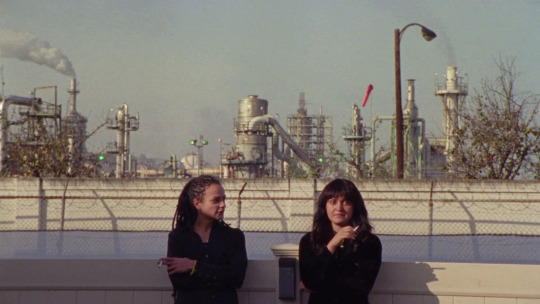

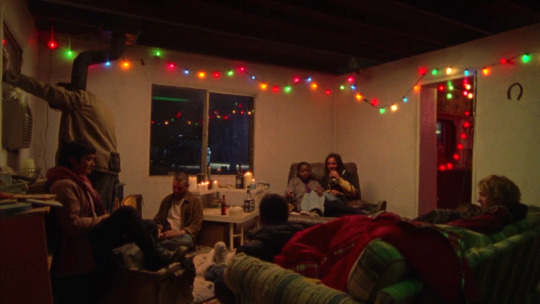


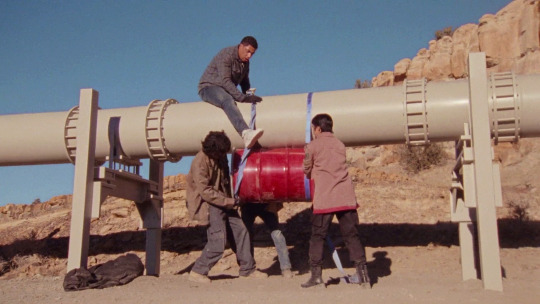


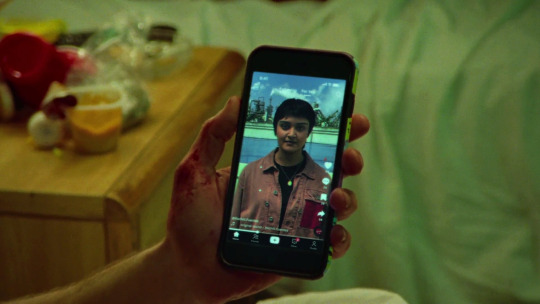
How to Blow Up a Pipeline (2022)
"We tried to combine these raw, gritty oil drum recordings with these distorted and pulsing synth sounds... This is the first time I’ve traveled to a set to sample and record actual oil drums, pipes, and found sounds to create a score... We had a drumstick with a super bouncy ball attached to the [oil drum], and we dragged it across the metal pipes to create ominous, resonate drones."
Gavin Brivik on producing the film's opening track 'Why I Destroyed Your Property'
#how to blow up a pipeline#how to blow up a pipeline 2022#daniel goldhaber#ariela barer#kristine froseth#lukas gage#forrest goodluck#sasha lane#jayme lawson#marcus scribner#jake weary#irene bedard#gavin brivik#2020s#2022#filmedit#film#cinema#movies
345 notes
·
View notes
Text
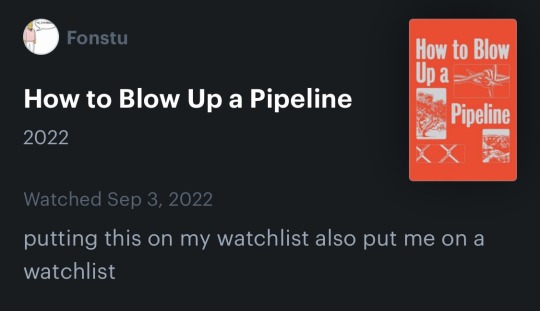
161 notes
·
View notes
Text



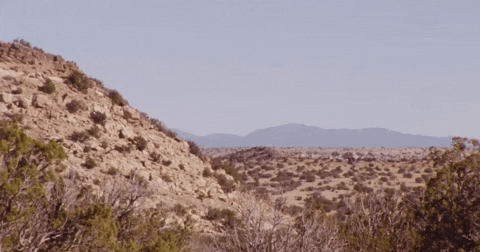


How to Blow Up a Pipeline (2022) dir: Daniel Goldhaber
5 notes
·
View notes
Text
I think anyone complaining about Bell's Hells morality as we near the end of Critical Role Campaign 3 and whether they truly get to claim they're representatives of the Exandrian people should go watch How To Blow Up A Pipeline (2022) about direct action environmental rights activists. And the documentary Hit & Stay (2013) about the anti-Vietnam War Catholic Far Left activists while you're at it. Or The Trial of the Catonsville Nine (1972) which is based on a play written by one of the priests profiled in Hit & Stay about their trial (grandstanding in the trial was one of the intents of being arrested).
It turns out that when you're not in a binary morality unquestioned heroism YA novel that what is justified in fighting systems of oppression and what the right thing to do is actually becomes hard to determine and largely driven by internal feelings and rage at injustice.
Who determines who gets to have a big say? Who determines what actions are justified when no one will listen to the harm being done? Who determines what is overall the more harmful action? Especially when you can't know the future except that there is no option where tremendous harm is not done. Who determines which step along any road is "right" or even "wise?" Especially when they are taken one by one by specific people who are swept up by the events of their own lives and not predetermined by an all-seeing all-knowing Author writing backwards from the ending?
Playing a game isn't the same as acting in the real world at great personal cost, but real life is a kind of improv. Long form improv doesn't start with how the ending should get tied up. It's about how every single split second decision adds up to a cumulative finale. Things not turning out how you'd have played them out if you already knew everything and were living someone else's life is what reality is like.
The normal state of affairs is people making decisions you don't agree with. "They shouldn't have done that" is boring and useless analysis that shuts down further thought and dismisses what anyone else has to say. "Why did they do that" is what media literacy is about. Campaign 3 was never heroic fantasy (arguably C1 & C2 weren't either). It's a character study in people doing what they feel they must in the moment it's happening without any assurances at all that it's the right thing. It's about not having confidence and surety but having to act anyway. That's the entire point.
How To Blow Up A Pipeline (2022) is a great expression of that same dynamic. They have enough confidence to keep telling each other this is the most necessary action they can take because they don't know what the future looks like, but one where they did nothing isn't one they can stand to live through. Is blowing up this pipeline in the way they are planning to the best possible course of action morally and strategically? Literally nobody knows that. They can't possibly know that. It only matters that these people got to that point, and now it's all happening flaws and all. For love, for revenge, for discord in the face of a society that acts like this is normal. A bunch of righteous fuckups just trying to survive in a harsh world made harsher by the status quo.
If nearly 437 hours of game play was too much to sit through to get that point across, maybe 104 minutes will work better.
#critical role#critical role spoilers#critical role discourse#critical role meta#critical role campaign 3#bell's hells#Predathos#ludinus da'leth#How to blow up a pipeline#how to blow up a pipeline (2022)#Hit & Stay#Hit & Stay (2013)#The Trial of the Catonsville Nine#The Trial of the Catonsville Nine (1972)#media analysis#media literacy
24 notes
·
View notes
Text

How To Blow Up A Pipeline (2022)
15 notes
·
View notes
Link
a little fic about “how to blow up a pipeline” (2022). F/F, 1.2k.
excerpt:
How do you blow up a pipeline?
Well, first of all, you need to love the pipeline. To caress it, in sonnets and intricate equations. To run your hands down its smooth metal, to crawl inside and hold your breath, let the oil wash over you until you dissolve deep within.
#how to blow up a pipeline#how to blow up a pipeline (2022)#alisha/theo#fanfic#writing#as far as i can tell i'm the first person to post fic for this movie which is fun#apologies to the ao3 tag wrangler who will be dealing with me
11 notes
·
View notes
Photo
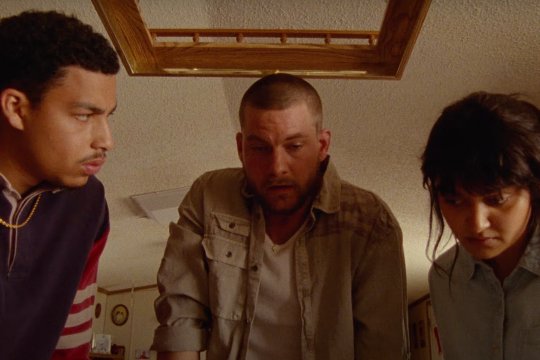
How to Blow Up A Pipleline (dir. Daniel Goldhaber) x TIFF 2022.
[It] adapts Swedish academic Andreas Malm’s non-fiction climate activist book about ecological sabotage into a gripping contemporary heist thriller. Set in the vast oil fields of West Texas, the film’s radical message of driving active change through destruction and property damage frames an intriguing narrative hook of justifiable eco-terrorism for the greater good to save humanity from ourselves.
#how to blow up a pipeline#pipeline#daniel goldhaber#neon#tiff#tiff 2022#ariela barer#movie#movies#movie review#film#film review#indie film#indie movie#cinema#andreas malm#kristine froseth#lukas gage#forrest goodluck#sasha lane#jayme lawson#marcus scribner#jake weary#irene bedard
4 notes
·
View notes
Text

How to Blow Up a Pizza Hut

when the meme goes too far and now has a body count
#that's a joke based on the title of the 2022 film How to Blow Up a Pipeline where Pipeline is replaced with Pizza Hut#it should not be construed as intent of any action and is not such
34K notes
·
View notes
Text
The Weekly Gravy #135
Medusa Challenger (1976) – *** Last week I reviewed a little-known short film which marked the screen debut of Christopher Walken; this week I review a (now) little-known short film which marked the screen debut of Joe Mantegna. He plays Joey, a mentally handicapped young man who helps his uncle Jack (Jack Wallace) sell carnations in the streets of Chicago. While plying their trade on the Lake…

View On WordPress
#2022 Films#2022 in Film#2023 Films#2023 in Film#Beau is Afraid#Film Reviews#How to Blow Up a Pipeline#Medusa Challenger#The Philadelphia Story#The Weekly Gravy
0 notes
Text
The full list is quite long, so I didn't want to clutter up the last post with it---still, it is impressive to see them all laid out together. So without further ado!
THE 50 MOVIES AND 50ISH BOOKS I WATCHED/READ IN 2024
MOVIES
The Count of Monte Cristo (2024) Emilia Pérez (2024) Wicked (2024) American Psycho (2000) Heavy Trip (2018) La Planète sauvage / Fantastic Planet (1973) The Slipper and the Rose (1973) Bottoms (2023) I Saw the TV Glow (2024) *We’re All Going to the World’s Fair (2021) Oddity (2024) Maxxxine (2024) *The Substance (2024) *The Wicker Man (1973) Housebound (2014) Problemista (2023) Showing Up (2023) *Arsenic and Old Lace (1944) It Comes at Night (2017) The Boy and the Heron (2023) Abigail (2024) Seven Samurai (1954) The Iron Claw (2023) Talk to Me (2023) Bodies Bodies Bodies (2023) Rashomon (1950) *M (1931) Lord of Misrule (2023) The Tale of Princess Kaguya (2013) *Crimes of the Future (2022) Sanctuary (2022) After Yang (2022) **The Florida Project (2017) Pig (2021) The Favourite (2018) Poor Things (2023) Infinity Pool (2023) The Feast (2021) Office Space (1999) *Corsage (2022) Robots (2023) The Deer King (2021) Madame de… (1953) Orphée (1950) Master Gardener (2022) *Something in the Dirt (2022) Black Orpheus (1959) Priscilla (2023) How to Blow Up a Pipeline (2022) *The Lure (2015) To Wong Foo, Thanks for Everything! Julie Newmar (1995)
BOOKS
The Shambling Guide to New York City, Ghost Train to New Orleans, Mur Lafferty What Feasts At Night, T. Kingfisher *Bad Girls, Camila Sosa Villada Don't Fear the Reaper, Stephen Graham Jones *Vintner's Luck, Elizabeth Knox The Barrow Will Send What it May, Margaret Killjoy You Know How the Story Goes, Thomas Olde Heuvelt Bloodchild, Wild Seed, Octavia E. Butler The Angel of Indian Lake, Stephen Graham Jones The Default World, Naomi Kanakia Fantasyland, Mike Bockoven Something is Killing the Children, issues 1-15 The Night Eaters Book 1, Book 2, Marjorie Liu This Wretched Valley, Jenny Kiefer These Deathless Bones, Cassandra Khaw *Dead Inside, Chandler Morrison Mental Diplopia, Julianna Baggott A Human Stain, Kelly Robson The Shape of My Name, Nino Cipri Daughter of Necessity, Marie Brennan The Mist, Stephen King A Skinful of Shadows, Frances Hardinge The Chalk Man, C. J. Tudor *The Rehearsal, Eleanor Catton Come Closer, Sara Gran The Underwater Welder, Jeff Lemire Blink, Christopher Sebela Pulling the Wings Off Angels, KJ Parker Thirteen Ways to Kill Lulabelle Rock, Maud Woolf An Elderly Lady Is Up to No Good, Helene Tursten Thornhedge, T. Kingfisher HEX, Thomas Olde Heuvelt Midnight Rooms, Donyae Coles Aglaeca, Mohnfisch Dr. Limos Plays God, Stevie Barot Home by the Rotting Sea, Otava Heikkila Last Crane, Narsid Sacred Bodies, Ver No Trouble at All, Various Authors (short story collection) *Wylding Hall, Elizabeth Hand Glass House, Paul Jessup Agony's Lodestone, Laura Keating * Big Swiss, Jen Beagin House of Rot, Danger Slater Dreadful, Rebecca Rozakis *Diavola, Jennifer Thorne Lute, Jennifer Thorne Regrettably, I Am About To Cause Trouble, Amie McNee The Rules Upheld by No One, Amie McNee The Sacrifice, Rin Chupeco The Bog Wife, Kay Chronister The Unmothers, Leslie J. Anderson *The Eyes Are the Best Part, Monika Kim Paying for It, Chester Brown Snow, Ronald Malfi Midnight on Beacon Street, Emily Ruth Verona Haunt Sweet Home, Sarah Pinsker The Doll-Master, Joyce Carol Oates The Third Person, Emma Grove The Werewolf at Dusk, David Small It's Lonely At The Centre Of The Earth, Zoe Thorogood Mom's Cancer, Brian Fies Mary Astor's Purple Diary, Edward Sorel Impossible People, Julia Wertz Roaming, Jillian Tamaki
45 notes
·
View notes
Text

31 notes
·
View notes
Photo


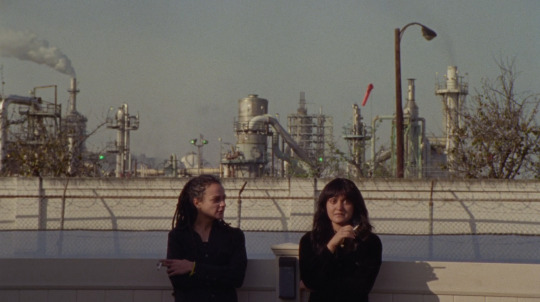

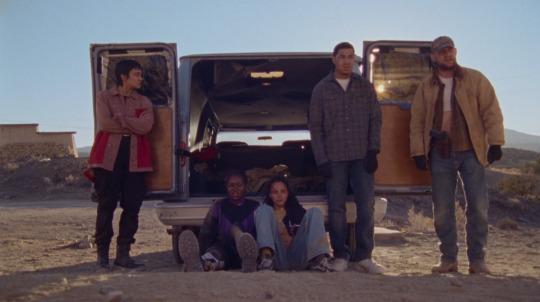
how to blow up a pipeline (2022)
#how to blow up a pipeline#film#movie#cinema#art#edit#screencaps#photography#cinematography#2020s#indie#daniel goldhaber#ariela barer#sasha lane#jake weary#marcus scribner#jayme lawson
275 notes
·
View notes
Text
How To Blow Up A Pipeline (2022) is a phenomenal film, holy shit. A crew of young environmental activists work to blow up an oil pipeline in West Texas. It intersperses their mission meeting up and building the bomb with the events that led each to believe this was a righteous and necessary stand.
It reminds me a lot of the actions of the Vietnam-era anti-war Catholic left activists like the Berrigan brothers. Hit & Stay (2013) is a great documentary about them. The Trial of the Catonsville Nine (1972) is based on the play that Father Daniel Berrigan wrote about their trial.
So much physical & psychological violence has been done to them by the oil & gas industry. Killing their loved ones, taking + poisoning their land, killing them, destroying their homes & their lives. The tragedy at the heart of it is their actions are as heroic and logical as they are doomed.
I really like that this isn't an action movie about trying to kill "the bad guys." The intent is to not kill anyone, even though that rage is there. Even though the industry is killing them. It hones it into more of a pointed moral dilemma than yet another mindlessly violent American action film.
I also like that it centers the ecological violence done to communities of color the most. The exhausted rage of continuing to struggle against a system that doesn't view them or their ancestors as human. Class is another defining struggle. Economics robbing people of self-determination.
It took such a complex issue with so much nuance and drew so much out of it. In a lot of ways it didn't have answers, but it illuminated so many of the core questions. And asked very earnestly and openly in the face of all this how we SHOULD fight.
It's on Hulu right now, or for rent/purchase various places.
youtube
#media analysis#how to blow up a pipeline#how to blow up a pipeline (2022)#queer media#lesbian films#Jewish films#Black Films#Indigenous Films#environmental racism#environmental classism#environmental activism#direct action#Andreas Malm#Daniel Goldhaber#Ariela Barer#Kristine Froseth#Lukas Gage#Forrest Goodluck#Sasha Lane#Jayme Lawson#Marcus Scribner#Jake Weary#Irene Bedard#Youtube
7 notes
·
View notes
Text
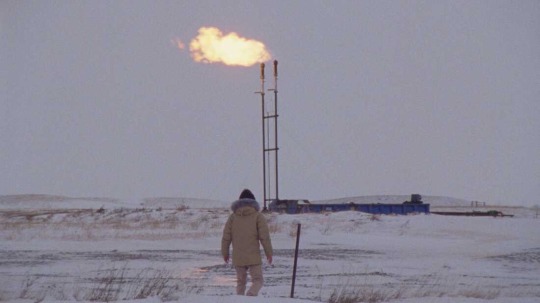
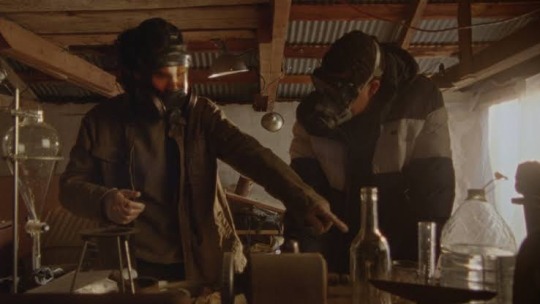

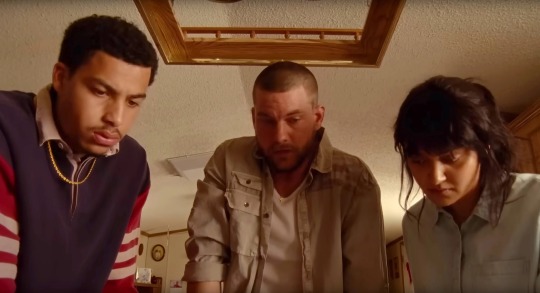
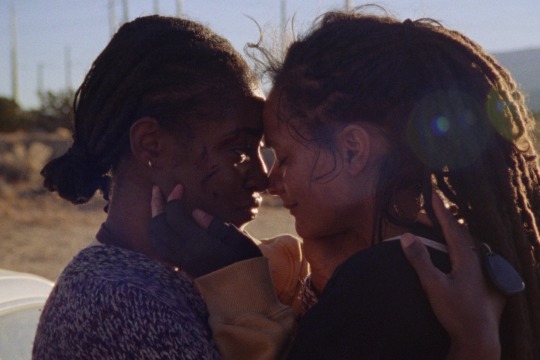
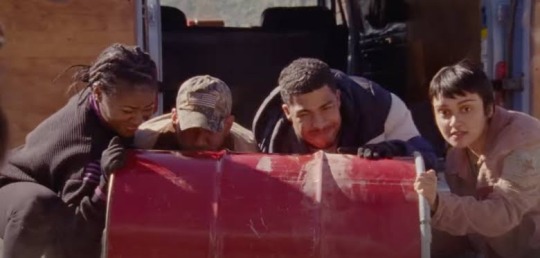

How to Blow Up a Pipeline (2022)
Dir. Daniel Goldhaber
284 notes
·
View notes
Text
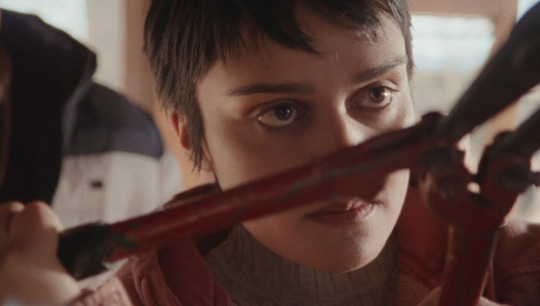
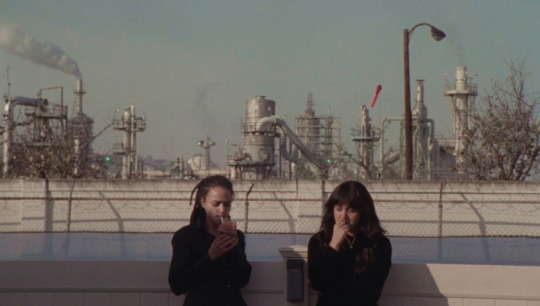
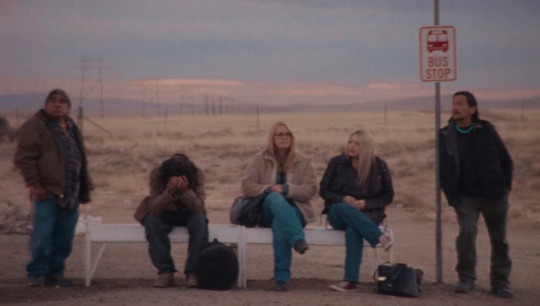
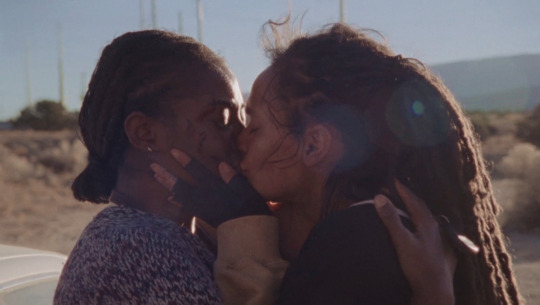
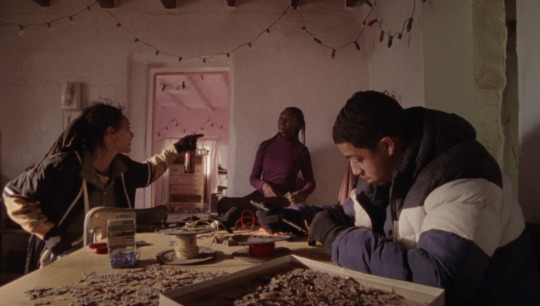





how to blow up a pipeline (2022) dir: daniel goldhaber
20 notes
·
View notes
Note
2, 6, 11, 19
2. What was your favorite movie of the ones you watched this year?
I watched some really, really excellent movies this year but - if I had to choose from the line-up, I think Kissed (1996) changed and validated my personhood in a way few movies ever have.
6. What genre did you watch the most the year?
horror, in no small part because @devilbearingtrouble and I watched 24 of them together over the year + I participated in hooptober.
11. Recommend any movie you watched this year.
The Remarkable Life of Ibelin (2024), it's a documentary about a disabled man's online life on WoW and the ripple effect it had on his friends and family. the majority of the documentary is animated in the WoW style and it's one of those movies that makes it really hard not to cry.
19. Are there any movies you're looking forward to next year? This can be new releases, or movies you just plan on watching for the first time.
I just made my '25 watchlist! I think the movies I most look forward to seeing next year are:
the color of money (1986), the wolf house (2018), how to blow up a pipeline (2022), mad god (2021), hellbender (2021), private parts (1972), and the baby (1973)
there aren't any new releases I'm looking forward to outside of the eventual release of the third spiderverse movie.
#mailbox#ask game#great questions. I LOVE gabbing about movies#also I am not rec'ing kissed (1996) unless you can stomach the summary. it was just my favorite thing I've seen this year lol
6 notes
·
View notes